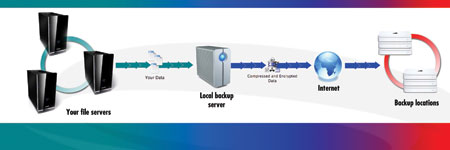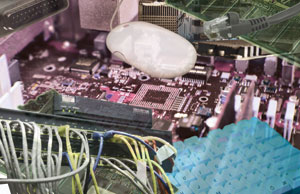The vast majority of dental practices are still playing fast and loose with their data. New electronic technologies from digital x-rays and photography to electronic scheduling and charting, as well as the migration to a paperless office, are rapidly expanding the amount and type of data dentists need to capture and store electronically.
State board requirements pertaining to the retention and handling of patient data, federal legislation such as HIPAA, and newer e-discovery requirements related to the backup, archiving, and recovery of files have also firmly placed these practices in the spotlight.
The reality, however, is that many dentists have not kept up with technology when it comes to how they choose to back up and safeguard their data. Alarmingly, some do not even follow a regular backup routine of any kind.
Studies show that half of all small businesses do not have a formal backup procedure (dentists are no different), and that the reliability of their data backup systems is their second most extremely or very challenging issue. It’s a high-risk, out-of-sight, out-of-mind scenario that begs the question, how much is a patient’s data worth?
Ian E. Shuman, DDS, is a Maryland general dentist caring for 200 patients a month. He has a staff of six and has totally remade the practice since he purchased it 11 years ago. Today his office is completely paperless and he uses an online backup service with a local server for instant restores.
Like many dentists, he used to back up his data to tape on a weekly basis. While generally considered low-tech and fairly inexpensive, tapes have many drawbacks. Managing and administering the hassles of tape backup and restore is time consuming, often unreliable, and complex. It is a task that typically falls to the office manager, who may or may not be technically adept.
 |
|
Illustration by Nathan Zak
|
The fallout is measured in studies that show that at least 20% of data recovery attempts by small and medium businesses fail due to human error in the backup process or in the interchange and handling of tapes. Research by The Gartner Group also shows that 40% to 50% of all backups are not recoverable in full, and that 60% of all backups fail in general.
My experience offering IT systems support to the dental industry over the past 5 years supports these findings. The combination of human error and technical tape failure (eg, forgetting to back up, forgetting to change tapes, losing tapes, tape failures, and the ensuing inability to recover data make tape a risky proposition. And as dental offices start to see the need to store 50, 100, or even 150 gigabytes of data at a time, tape becomes increasingly expensive and a greater liability.
THE COST OF DOING NOTHING
I commonly ask clients, “How much is your business worth?” If they had to re-enter all their data manually, the cost would be astronomical, and yet, that is what many dentists gamble with every day.
The loss of critical business records, such as accounts receivable, patient records, or transaction histories, can be a business death blow, or at the very least make treating patients more difficult and less efficient. State board requirements, HIPAA privacy and security requirements, and 2006 e-discovery regulations that govern recoverability of digital data (civil procedure rules require that e-mail and files related to litigation be available within 90 days of a request) all contribute to an increased need for a backup and recovery system that is automatic, secure, reliable, and affordable.
THE COST AND ADVANTAGES OF NEW TECHNOLOGY
If you’re currently using tape or even removable hard drives to back up your data and you’ve never had a problem, you may just be lucky. Or you may be one of the few practices that are diligent in backing up regularly, checking tapes, changing and rotating tapes, removing tapes to another location for secure storage, and the several other steps involved in maintaining an optimal tape backup system. In reality, this rarely happens.
If you believe you have no choice but to stick with tapes or removable hard drives, and that alternative, high-tech solutions are outside your budget, you are almost certainly wrong.
New advances in technology as well as the plummeting price of disk-based backup have converged to allow server-based local and off-site backup to be deployed at about the same price as tape backup, with much greater peace of mind. Many dentists have discovered the savings in time, effort, and angst that switching from tape to a managed solution offers.
WHY CHOOSE OFF-SITE BACKUP?
Unlike tapes, automatic off-site backup does not require day-to-day labor. At Dental Technology Center we specify and support the BitLeap automatic off-site backup service. It allows offices to customize data backup solutions that work for them and provides the knowledge that their data is protected each day. No matter who is out sick, on vacation, or just forgetful that day, the data is being protected. You can also back up and restore data online from wherever you are, and you can check to see that files are securely backed up. No guessing, no crossed fingers involved.
RELIABILITY AND COMPLIANCE
BitLeap can store every version of every file that ever existed on your local network. Furthermore, it is stored at 2 secure off-site locations using high-quality, high-redundancy RAID-5 storage arrays. Proprietary technologies mean that only new or changed data needs to be backed up, and that standard broadband Internet connections are more than sufficient to transfer data. BitLeap also faithfully follows HIPAA standards in regard to transmission security, encryption, physical security, and access control.
Because BitLeap uses a hardware-based solution to conduct its automatic off-site backups and a local server that physically sits in the dentist’s office (unlike software-only off-site backup services), there is the extra advantage of being able to restore data instantly off that local hard drive.
This high level of reliability and security, as well as the ease and speed of backup and recovery is simply not matched by tape. Tapes can disappear, and the technical annual failure rate of tapes—anywhere from 1 to 12 percent—is unacceptable. Having to maintain multiple tapes from previous days with daily snapshots in case the first tape does not restore is no way to run a modern dental office.
RETURN ON INVESTMENT
Customers using the BitLeap solution through Dental Technology Center are paying $89 to $219 per month to back up (and to instantly access) all of their data. Most dental customers are backing up from 50 to 100 gigabytes of data. As each practice (and volume of data) grows, dentists can can simply upgrade their accounts. They are no longer spending money to replace tapes every year and clean them monthly, as recommended. They are not faced with the need to up-grade to larger tapes as their backup needs mushroom. There are no general administrative or labor costs to bear.
WHEN DISASTER STRIKES
It is a fact of human nature that data protection or a serious examination of the options often is neglected until disaster strikes. Consider the high-stakes risks associated with natural disasters such as fire, flood, or hurricane, and it is glaringly obvious that a good data backup plan is virtually useless without an equally robust recovery plan in place.
A tape backup, even a current one with an off-site copy, is quite futile for companies in a post-disaster scenario. Imagine you are standing outside your flattened or burned- out building holding a tape in your hand. Among other things, you would have to buy a server compatible with your software, make sure it has a tape drive compatible with your tape, load the server software, and set up your users with the correct security rights.
Then would you need to install your application programs and reload your data. It can take multiple days or even weeks to get back to the point where you are fully operational. In the meantime, you may or may not be doing business.
The growing dependence of dental practices on information technology to operate and remain profitable dictates that they be able to recover from a data loss in near real-time.
For Dr. Shuman, the Maryland general dentist, backing up and safeguarding his patients’ data—whether digital x-rays or photos, or personal billing, insurance, and medical information—is a priority, one that he believes all dentists should be aware of and responsive to.
“My previous backup routine was never a sure bet,” he said. “Digital x-rays saved as large TIFF files create an enormous amount of data to be backed up and stored and command an enormous amount of space.
“I would tell other dentists that LeapServ (the local server from BitLeap) is like your digital filing cabinet. For those who are skeptical about the merits of a sound backup system, ask a colleague who was unable to restore his or her system due to lost data. It’s a very small investment tobe able to bring data back at the touch of a button.”
Instant access to data, built in redundancy, and automatic e-mail alerts if something should go wrong add up to real peace of mind. We’ve had instances where data has been corrupted due to a software glitch and we’ve been able to restore that data within 5 minutes, right from the local server. The office manager knows when there is a problem, and we are in a position to fix it right away.
For those dentists who have switched to this form of managed off-site data backup, their data and backup is no longer out of sight and out of mind. We know and they know what is happening at any time. That is real peace of mind.
Acknowledgement
The author thanks Ian Shuman, DDS, for his contribution to this article.
Mr. McNamara is president of Dental Technology Center, a Maryland-based IT company providing computers services and support to dental offices throughout the mid-Atlantic since 1994. He can be reached at (410) 877-3625 or
steve@dentaltechnologycenter.com.
Disclosure: Dental Technology Center has 30 clients that use BitLeap and is a reseller of the product.







